PHUKET: Thailand's policies governing refugees on its soil are making them vulnerable to arbitrary and abusive treatment despite the country's decades of experience as host for millions of refugees, Human Rights Watch said in a report issued today.
The 143-page report, ''Ad Hoc and Inadequate: Thailand's Treatment of Refugees and Asylum Seekers,'' finds that Thai refugee policies are not grounded in law and cause refugees of all nationalities to be exploited and unnecessarily detained and deported.
The report focuses on the plight of Burmese refugees, the largest current refugee group in Thailand. It examines treatment and conditions of both Burmese refugees inside the camps on the Thai-Burma border and Burmese outside the camps, who are not officially recognised as refugees.
The report also looks at the impact of political changes in Burma on the prospects for repatriation and the obstacles to resolving this protracted refugee situation.
''Thailand presents Burmese refugees with the unfair choice of stagnating for years in remote refugee camps or living and working outside the camps without protection from arrest and deportation,'' said Bill Frelick, Refugee Program director at Human Rights Watch and co-author of the report. ''Refugees from other countries are barely tolerated, and Thai authorities sometimes arrest and detain them indefinitely.''
Thailand has not ratified the 1951 Refugee Convention and does not have a refugee law or functioning asylum procedures. It regards refugees of all nationalities living outside of designated refugee camps for Burmese as being in the country illegally.
The Thai government has registered as refugees only about 60 percent of the 140,000 people in the nine refugee camps along the Burmese border, and minimally protects those it has registered as long as they remain there. The government, which has registered very few refugee cases in the camps since mid-2006, has yet to register the remaining 40 percent of the camps' population, leaving them particularly vulnerable.
Burmese outside the camps are subject to arrest and immediate deportation unless they present themselves not as refugees but as migrant workers, and go through the expensive, difficult, and often corrupt process for obtaining migrant worker status.
Legally recognised migrant workers receive two-year visas, renewable once, and then must return to their home countries. The requirement to repatriate effectively precludes refugees from seeking migrant worker status.
''Thailand should provide all asylum seekers a fair chance to have their refugee claims heard and should allow refugees to move about and work,'' Frelick said. ''This would enable refugees to learn skills and reduce opportunities for exploitation, while allowing them to contribute to Thailand's economy.''
Thailand does not allow the United Nations refugee agency (UNHCR) to conduct refugee determination screening for asylum seekers from Burma, Laos, or North Korea. UNHCR is permitted to issue ''Persons of Concern'' certificates to other refugees, but these certificates provide no employment authorisation and little protection when police confront certificate holders on the street or in their homes.
Developments in Burma may impact Thai refugee policy, Human Rights Watch said. After decades of ethnic armed conflict and repression in Burma, recent changes - including the signing of preliminary ceasefire agreements between the Burmese government and nearly all non-state armed groups - raise the prospect that the Burmese refugees in the Thai border camps may be able to go home.
But enormous obstacles remain, including lack of firm political settlements, landmines, and Burma's refusal to allow UNHCR to work on the Burmese side of the border.
''To its credit, Thailand is waiting to see how the situation in Burma develops and does not appear to be pushing for the hasty return of Burmese refugees,'' Frelick said. ''So now is a good time for Thai officials to think creatively and strategically about how best to prepare refugees for an eventual safe repatriation and reintegration in Burma.''
Thailand's policy of restricting the movements of Burmese refugees in the camps and prohibiting them from working has led to social dysfunction. The policy makes it less likely that the refugees will be prepared for successful reintegration into their communities when they do return home, Human Rights Watch said.
Most of the camps are in isolated mountain locations, accessible only by dirt roads. Some are overcrowded, and basic assistance, such as food and shelter, has been reduced as international donors shift their attention to programs inside Burma. The isolation has led to abuse of power and impunity for rights violations, including for Thai officials mandated to protect the refugees.
Fear, uncertainty, and a feeling of powerlessness contribute to a fatalistic attitude among camp refugees about whether they can approach the police and other security officials to seek justice.
''We are on Thai land so we have to be submissive,'' said one. ''We cannot speak out and we have to be patient and passive. If we speak out too much, the chains around us will be tightened.''
Many of the better-educated and higher-skilled refugees in the camps - including many teachers and health workers - have resettled to countries outside the region, leaving a residual camp population with less social support and fewer coping skills.
After so many years with restrictions on movement and dependency on outside aid, many camp residents experience domestic abuse, depression, and other social and mental health problems.
Thai policy does not recognise the concept of refugee status as applying to Burmese outside the camps. The authorities treat refugees who leave the camps as illegal immigrants, subject to arrest.
Thai police, soldiers, or paramilitaries who apprehend camp residents outside the camps either send them back, often after exacting forced labor or requiring bribes, or send them to one of Thailand's Immigration Detention Centers, from which they are deported to Burma.
Some refugees told Human Rights Watch that Thai authorities were physically abusive when they apprehended them outside the camps. A 33-year-old Karen man living in Mae La camp said that after Thai police arrested him in May 2008: ''They asked for money . . . I said, 'I don't have money.' Then one started to beat me here and then back here [on the back and shoulders], two times and then kicked me once . . . They started searching our bag for money. They asked for 2000 baht [US$64] and we didn't have that money. Then he looked in my bag and he saw my UNHCR ID card and he took it away.''
Thailand should work with UNHCR to establish a fair and transparent refugee screening and registration system for the 40 percent of the camp population that is unregistered, Human Rights Watch said.
The government should engage with refugee leaders, nongovernmental organisations, UNHCR, and donors for an orderly transition to an open-camp model that helps refugees become self-sufficient and prepares them to reintegrate in Burma when it is safe for them to return.
Some donors, notably the Europeans, have already begun switching their assistance to what is called a ''livelihoods strategy,'' to develop skills to live and work outside a camp environment. Such an approach will only work effectively if refugees are allowed to leave the camps to work, Human Rights Watch said.
''The Thai authorities should ensure that all refugees, including those in camps, have full access to the Thai justice system and that police and other officials who extort and abuse refugees are appropriately disciplined or prosecuted,'' Frelick said.
''A policy that engages refugees in decision-making about their future and develops their skills will not only benefit Thailand in the short-term, but will also pave the way for voluntary and sustainable repatriation that will engender goodwill toward Thailand after refugees return home.''
Burmese nationals caught outside the camps usually only spend a few days to a week in Immigration Detention Centers before they are deported or released. But Thai authorities rarely use government funds to deport people to countries that do not border Thailand, holding them indefinitely until their relatives provide plane tickets.
Migrants without financial resources or refugees unwilling to return home because they fear persecution can spend a long time - sometimes years - in Immigration Detention Centers, even though they are not designed for long-term detention.
A Nepalese refugee in one IDC told Human Rights Watch that although UNHCR recognized him as a refugee, he had been detained for three years and nine months:
''The Bible talks about hell. This is one part of hell . . . I am with 80 people in the room, sometimes 150 people, three toilets. Always there are problems . . . If you don't follow the rules, you get handcuffed, one week, two weeks . . . We have no telephone . . . to get outside information.''
The Thai government should ratify the 1951 Refugee Convention and its 1967 Protocol and pass refugee laws to carry out the convention's obligations and establish fair asylum procedures. Thailand should make refugee status open to all nationalities under the same criteria, consistent with the international refugee definition, including protection for people fleeing conflict.
And Thailand should immediately release UNHCR-recognised refugees from detention and stop holding detainees indefinitely to force their families to pay for their deportation.
International agencies and donors should continue to provide food and other humanitarian aid to refugees who are unable to support themselves or who need transitional help toward self-sufficiency, Human Rights Watch said.
Thai authorities should immediately ensure that all refugees - including those in camps - have full access to the Thai justice system and that police and other security officials who extort and abuse refugees, asylum seekers, and migrants are disciplined or prosecuted.
''Ad Hoc and Inadequate: Thailand's Treatment of Refugees and Asylum Seekers'' is available at:
http://www.hrw.org/reports/2012/09/13/ad-hoc-and-inadequate
The 143-page report, ''Ad Hoc and Inadequate: Thailand's Treatment of Refugees and Asylum Seekers,'' finds that Thai refugee policies are not grounded in law and cause refugees of all nationalities to be exploited and unnecessarily detained and deported.
The report focuses on the plight of Burmese refugees, the largest current refugee group in Thailand. It examines treatment and conditions of both Burmese refugees inside the camps on the Thai-Burma border and Burmese outside the camps, who are not officially recognised as refugees.
The report also looks at the impact of political changes in Burma on the prospects for repatriation and the obstacles to resolving this protracted refugee situation.
''Thailand presents Burmese refugees with the unfair choice of stagnating for years in remote refugee camps or living and working outside the camps without protection from arrest and deportation,'' said Bill Frelick, Refugee Program director at Human Rights Watch and co-author of the report. ''Refugees from other countries are barely tolerated, and Thai authorities sometimes arrest and detain them indefinitely.''
Thailand has not ratified the 1951 Refugee Convention and does not have a refugee law or functioning asylum procedures. It regards refugees of all nationalities living outside of designated refugee camps for Burmese as being in the country illegally.
The Thai government has registered as refugees only about 60 percent of the 140,000 people in the nine refugee camps along the Burmese border, and minimally protects those it has registered as long as they remain there. The government, which has registered very few refugee cases in the camps since mid-2006, has yet to register the remaining 40 percent of the camps' population, leaving them particularly vulnerable.
Burmese outside the camps are subject to arrest and immediate deportation unless they present themselves not as refugees but as migrant workers, and go through the expensive, difficult, and often corrupt process for obtaining migrant worker status.
Legally recognised migrant workers receive two-year visas, renewable once, and then must return to their home countries. The requirement to repatriate effectively precludes refugees from seeking migrant worker status.
''Thailand should provide all asylum seekers a fair chance to have their refugee claims heard and should allow refugees to move about and work,'' Frelick said. ''This would enable refugees to learn skills and reduce opportunities for exploitation, while allowing them to contribute to Thailand's economy.''
Thailand does not allow the United Nations refugee agency (UNHCR) to conduct refugee determination screening for asylum seekers from Burma, Laos, or North Korea. UNHCR is permitted to issue ''Persons of Concern'' certificates to other refugees, but these certificates provide no employment authorisation and little protection when police confront certificate holders on the street or in their homes.
Developments in Burma may impact Thai refugee policy, Human Rights Watch said. After decades of ethnic armed conflict and repression in Burma, recent changes - including the signing of preliminary ceasefire agreements between the Burmese government and nearly all non-state armed groups - raise the prospect that the Burmese refugees in the Thai border camps may be able to go home.
But enormous obstacles remain, including lack of firm political settlements, landmines, and Burma's refusal to allow UNHCR to work on the Burmese side of the border.
''To its credit, Thailand is waiting to see how the situation in Burma develops and does not appear to be pushing for the hasty return of Burmese refugees,'' Frelick said. ''So now is a good time for Thai officials to think creatively and strategically about how best to prepare refugees for an eventual safe repatriation and reintegration in Burma.''
Thailand's policy of restricting the movements of Burmese refugees in the camps and prohibiting them from working has led to social dysfunction. The policy makes it less likely that the refugees will be prepared for successful reintegration into their communities when they do return home, Human Rights Watch said.
Most of the camps are in isolated mountain locations, accessible only by dirt roads. Some are overcrowded, and basic assistance, such as food and shelter, has been reduced as international donors shift their attention to programs inside Burma. The isolation has led to abuse of power and impunity for rights violations, including for Thai officials mandated to protect the refugees.
Fear, uncertainty, and a feeling of powerlessness contribute to a fatalistic attitude among camp refugees about whether they can approach the police and other security officials to seek justice.
''We are on Thai land so we have to be submissive,'' said one. ''We cannot speak out and we have to be patient and passive. If we speak out too much, the chains around us will be tightened.''
Many of the better-educated and higher-skilled refugees in the camps - including many teachers and health workers - have resettled to countries outside the region, leaving a residual camp population with less social support and fewer coping skills.
After so many years with restrictions on movement and dependency on outside aid, many camp residents experience domestic abuse, depression, and other social and mental health problems.
Thai policy does not recognise the concept of refugee status as applying to Burmese outside the camps. The authorities treat refugees who leave the camps as illegal immigrants, subject to arrest.
Thai police, soldiers, or paramilitaries who apprehend camp residents outside the camps either send them back, often after exacting forced labor or requiring bribes, or send them to one of Thailand's Immigration Detention Centers, from which they are deported to Burma.
Some refugees told Human Rights Watch that Thai authorities were physically abusive when they apprehended them outside the camps. A 33-year-old Karen man living in Mae La camp said that after Thai police arrested him in May 2008: ''They asked for money . . . I said, 'I don't have money.' Then one started to beat me here and then back here [on the back and shoulders], two times and then kicked me once . . . They started searching our bag for money. They asked for 2000 baht [US$64] and we didn't have that money. Then he looked in my bag and he saw my UNHCR ID card and he took it away.''
Thailand should work with UNHCR to establish a fair and transparent refugee screening and registration system for the 40 percent of the camp population that is unregistered, Human Rights Watch said.
The government should engage with refugee leaders, nongovernmental organisations, UNHCR, and donors for an orderly transition to an open-camp model that helps refugees become self-sufficient and prepares them to reintegrate in Burma when it is safe for them to return.
Some donors, notably the Europeans, have already begun switching their assistance to what is called a ''livelihoods strategy,'' to develop skills to live and work outside a camp environment. Such an approach will only work effectively if refugees are allowed to leave the camps to work, Human Rights Watch said.
''The Thai authorities should ensure that all refugees, including those in camps, have full access to the Thai justice system and that police and other officials who extort and abuse refugees are appropriately disciplined or prosecuted,'' Frelick said.
''A policy that engages refugees in decision-making about their future and develops their skills will not only benefit Thailand in the short-term, but will also pave the way for voluntary and sustainable repatriation that will engender goodwill toward Thailand after refugees return home.''
Burmese nationals caught outside the camps usually only spend a few days to a week in Immigration Detention Centers before they are deported or released. But Thai authorities rarely use government funds to deport people to countries that do not border Thailand, holding them indefinitely until their relatives provide plane tickets.
Migrants without financial resources or refugees unwilling to return home because they fear persecution can spend a long time - sometimes years - in Immigration Detention Centers, even though they are not designed for long-term detention.
A Nepalese refugee in one IDC told Human Rights Watch that although UNHCR recognized him as a refugee, he had been detained for three years and nine months:
''The Bible talks about hell. This is one part of hell . . . I am with 80 people in the room, sometimes 150 people, three toilets. Always there are problems . . . If you don't follow the rules, you get handcuffed, one week, two weeks . . . We have no telephone . . . to get outside information.''
The Thai government should ratify the 1951 Refugee Convention and its 1967 Protocol and pass refugee laws to carry out the convention's obligations and establish fair asylum procedures. Thailand should make refugee status open to all nationalities under the same criteria, consistent with the international refugee definition, including protection for people fleeing conflict.
And Thailand should immediately release UNHCR-recognised refugees from detention and stop holding detainees indefinitely to force their families to pay for their deportation.
International agencies and donors should continue to provide food and other humanitarian aid to refugees who are unable to support themselves or who need transitional help toward self-sufficiency, Human Rights Watch said.
Thai authorities should immediately ensure that all refugees - including those in camps - have full access to the Thai justice system and that police and other security officials who extort and abuse refugees, asylum seekers, and migrants are disciplined or prosecuted.
''Ad Hoc and Inadequate: Thailand's Treatment of Refugees and Asylum Seekers'' is available at:
http://www.hrw.org/reports/2012/09/13/ad-hoc-and-inadequate

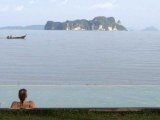

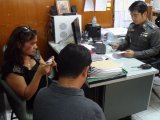






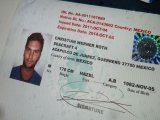

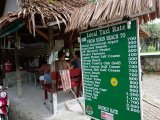
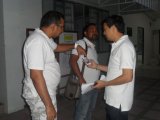





Very good article and right on the money...Very well reported...!
Posted by Ted Davis on September 14, 2012 10:57